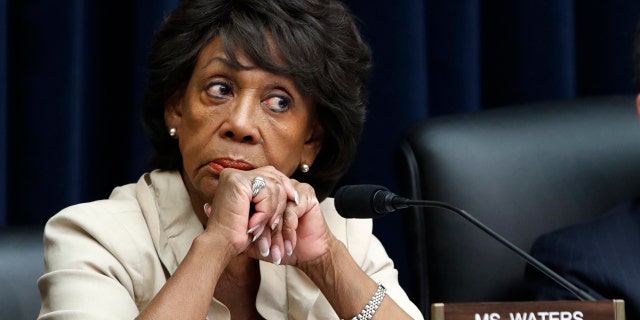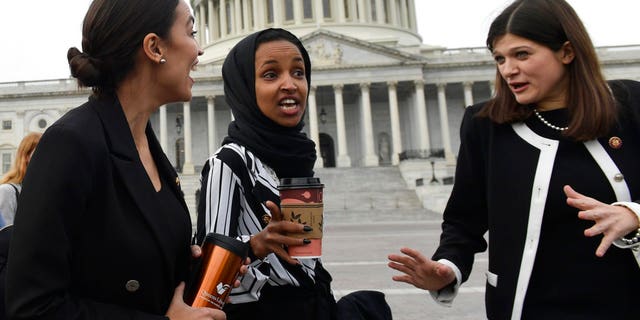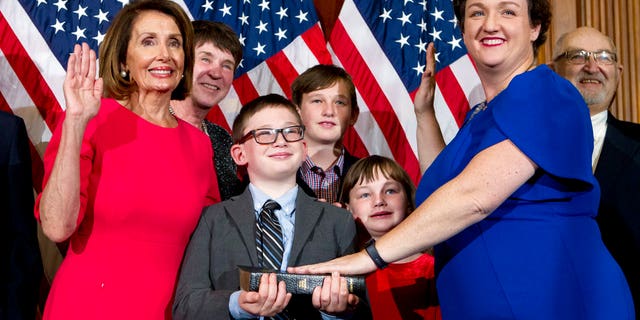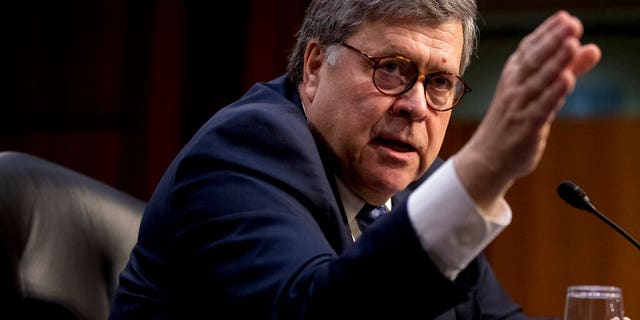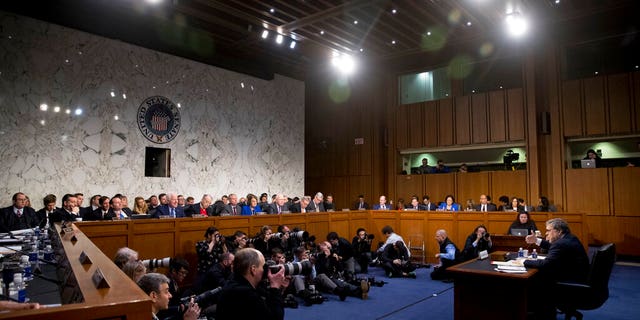New York Democratic Sen. Kirsten Gillibrand announced during a taping of Stephen Colbert's "Late Show" on Tuesday night that she has formed an exploratory committee for a 2020 presidential run, reversing her previous reassurances that she would continue to serve in the Senate instead.
Gillibrand, 52, will be entering an increasingly crowded field of Democrats seeking to unseat President Trump. She spoke largely in generalities on Tuesday, as she vowed to take on powerful "special interests" and work on behalf of children.
"I'm filing an exploratory committee for president of the United States, tonight," Gillibrand said, holding Colbert's hands as she spoke, in a video posted by CBS Tuesday afternoon. "I'm going to run for president of the United States because as a young mom, I'm going to fight for other people's kids as hard as I would fight for my own -- which is why I believe health care should be a right, not a privilege."
Fox News has learned that Gillibrand is heading to Iowa, which hosts the pivotal first-in-the-nation caucuses, on Friday for a meeting and fundraiser with local Democrats.
Less than three months ago, Gillibrand promised when asked directly about her possible White House ambitions that "I will serve my six-year term" in the Senate, rather than run for the presidency. Gillibrand won re-election in 2018, after being appointed to fill Hillary Clinton's seat in 2009.
New York GOP spokeswoman Jessica Proud had much the same criticism.
In a statement on Tuesday, she said: “It was only three months ago during the campaign that Kirsten Gillibrand point-blank lied to New Yorkers that she would fulfill her term if re-elected. In her lackluster career as an elected official, she has demonstrated a disturbing disregard for the truth and principled positions in the name of self-serving personal advancement. If she treats her current constituents with such disrespect, we shudder to think what she’d do to the nation.”
Added Republican National Committee (RNC) spokesman Michael Ahrens: “If you looked up ‘political opportunism’ in the dictionary, Kirsten Gillibrand’s photo would be next to it. From jumping on the ‘abolish ICE’ bandwagon to turning on the Clintons, Gillibrand always goes where the political wind blows. Democrats know it, which is why she’s barely registering in the polls.”
In her interview with Colbert, Gillibrand focused on providing equality of opportunity, which she said is currently "impossible."
"It's why I believe we should have better public schools for our kids, because it shouldn't matter what block you grow up on," she said. "And I believe that anybody who wants to work hard enough should be able to get whatever job training they need to be able to earn their way into the middle class.
"But you are never going to accomplish any of this things if you don't take on the systems of power that make all of that impossible, which is taking on institutional racism, it's taking on the corruption and greed in Washington, taking on the special interests that write legislation in the dead of night," Gillibrand concluded, haltingly and frequently interrupted by applause. "And I know that I have the compassion, the courage, and the fearless determination to get that done."
GILIBRAND MOCKED AS A PANDERER FOR SAYING THE FUTURE IS 'FEMALE,' 'INTERSECTIONAL'
Colbert's full interview with Gillibrand will air later Tuesday night.
Republicans, and some on the left, have recently criticized Gillibrand for apparently attempting to shed her moderate and establishment roots by pivoting deliberately and dramatically towards the progressive wing of the Democratic Party.
Analyst Nate Silver noted that Gillibrand has "the most anti-Trump voting record of any Democratic senator" -- but, he added, "that comes after she had a pretty moderate record when she was a House member from Upstate New York. Maybe it's not a bad thing in a system of representative government to change positions when you change constituencies, but she often gets accused of being opportunistic."
In December, Gillibrand was roundly mocked as a sexist panderer after saying the future is “female” and “intersectional."
“Our future is: Female, Intersectional, Powered by our belief in one another. And we’re just getting started,” Gillibrand wrote in a tweet.
Critics immediately claimed Gillibrand was trying to virtue signal to progressives ahead of run for president in 2020, looking to portray herself as a feminist firebrand.
U.S. Sen. Marco Rubio, R-Fla., for one, fired back at Gillibrand, saying “our future is: AMERICAN.”
“An identity based not on gender, race, ethnicity or religion. But on the powerful truth that all people are created equal with a God given right to life, liberty & the pursuit of happiness,” he added.
Gillibrand would become the fifth Democrat — and second senator — to jump into a presidential primary that could ultimately feature dozens of candidates. Sen. Elizabeth Warren of Massachusetts along with former Obama Cabinet member Julian Castro and Rep. Tulsi Gabbard of Hawaii are among those who have taken steps toward a 2020 run. Sens. Cory Booker of New Jersey and Kamala Harris of California could also enter the race soon.
While Gillibrand's prominence as a face of her party has grown, she faces a tough battle to capture the attention of Democratic voters in a crowded field that's expected to include multiple women. Several of her potential rivals have spent more time in critical primary states while Gillibrand has visited one — New Hampshire — in October to stump for the Democratic candidate for governor.
She's expected to move quickly this week to make connections in the leadoff caucus state of Iowa. She's scheduled to headline a meeting with Democratic activists in Sioux City on Friday evening. The event is to be held at a private home with top donors to the Woodbury County Democratic Party.
Gillibrand has been in touch with some Iowa Democrats and enlisted the help of Lara Henderson, who was finance director for Fred Hubbell, the 2018 Democratic candidate for governor. But she hasn't built up a network in the state to the degree of prospective rivals, including Booker and Harris.
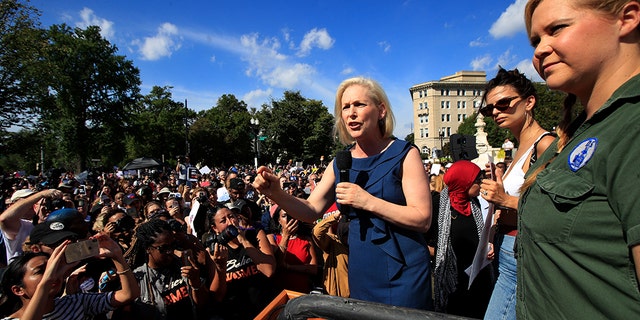
She was appointed to the Senate in 2009 to succeed Clinton, who became secretary of state, and she easily won re-election, most recently in November. She has $10.6 million in her campaign fund, which can be used to jump-start a presidential bid.
During her time in the Senate, Gillibrand has been a central figure in Washington's reckoning with the #MeToo era.
In 2017, she was the first Senate Democrat to call on Sen. Al Franken of Minnesota, a fellow Democrat, to resign amid multiple sexual misconduct allegations. That landed her in hot water with some of her colleagues and progressive supporters, who felt Franken was unfairly maligned.
Gillibrand has also said President Bill Clinton should have stepped down after his relationship with a White House intern was revealed and has also called on President Donald Trump to resign over sexual assault allegations.
And before #MeToo, Gillibrand spent several years pushing for legislation addressing sexual assault in the military and on college campuses.
In recent weeks, Gillibrand has worked to expand her fundraising network and improve her standing among key voting blocs, including African-American voters.




